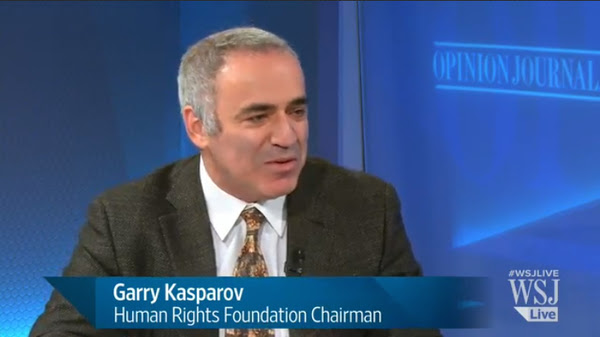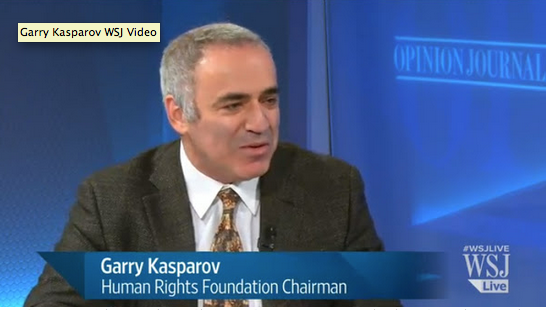Garry Kasparov: Cut Off the Russian Oligarchs and They’ll Dump PutinTarget their assets abroad, their mansions and IPOs in London, their yachts. Use banks, not tanks.By Garry Kasparov | March 7, 2014
VIDEO: Human Rights Foundation Chairman Garry Kasparov on why the U.S. won’t respond to
Putin’s aggression in Ukraine.For the second time in six years, Russian President Vladimir Putin has ordered Russian troops across an internationally recognized border to occupy territory. This fact must be stated plainly before any discussion of motives or consequences. Russian troops have taken Crimea and they are not leaving, despite the Ukrainian government’s protests. Five hundred kilometers southeast across the Black Sea, Russian soldiers still occupy parts of Georgia—South Ossetia and Abkhazia—where they have been since Mr. Putin’s 2008 invasion and de facto annexation.
Mr. Putin belongs to an exclusive club, along with Saddam Hussein and Slobodan Miloševic, as one of the very few leaders to invade a neighboring nation in the nuclear age. Such raw expansionist aggression has been out of fashion since the time of Adolf Hitler, who eventually failed, and Joseph Stalin, who succeeded. Stalin’s Red Army had its share of battlefield glory, but his real triumph came at the Yalta Conference in February 1945, three months before the end of the war in Europe. There Stalin bullied a feeble Franklin Roosevelt and a powerless Winston Churchill, redrawing the Polish borders and promising elections in Poland when he knew that the Communist government the Soviets were installing was there to stay.
Although it is a poignant coincidence, there is more to this look back to World War II than the fact that Yalta is located in Crimea. Mr. Putin’s tactics are easily, and accurately, compared to those of the Austrian Anschluss and the Nazi occupation and annexation of the Sudetenland in Czechoslovakia in 1938. There is the same rhetoric about protecting a threatened population, the same propaganda filled with lies, justifications, and accusations. Most of the Kremlin’s statements about Crimea could have been translated from German, with “Fatherland” replaced by “Motherland.” Mr. Putin is also following the Stalin model on Poland in Yalta: First invade, then negotiate. Crimea will be forced to hold a referendum on joining Russia in just 10 days, a vote on the Kremlin’s preferred terms, at the point of a gun.
Mr. Putin’s move in Crimea came just hours after now-former Ukrainian President Viktor Yanukovych scrambled up his puppet strings from Kiev to his master’s hand in Russia. He left behind thousands of papers and a few palaces, evidence of the vast scale of his personal and political corruption. His ejection, bought in blood by the courageous people of Ukraine, made Mr. Putin look weak. Like any schoolyard bully or crime boss, he immediately found a way to look and feel tough again. The historically pivotal Crimean peninsula, with its large Russia-leaning population and geographic vulnerability (and a Russian naval base), was the obvious choice.
As I have said for years, it is a waste of time to attempt to discern deep strategy in Mr. Putin’s actions. There are no complex national interests in a dictator’s calculations. There are only personal interests, the interests of those close to him who keep him in power, and how best to consolidate that power. Without real elections or a free media, the only way a dictator can communicate with his subjects is through propaganda, and the only way he can validate his power is with regular shows of force.
Inside Russia, that force comes with repression against dissidents and civil rights that only accelerated during the distraction of the Sochi Olympics. Abroad, force in the form of military action, trade sanctions or natural-gas extortion is applied wherever Mr. Putin thinks he can get away with it.
On Monday, the markets plummeted in response to the news that Russia had invaded a European nation. Just a few days later, as cautious statements emanated from the White House and the European Union, most markets had rebounded fully. This was due to an illusion of a resolution, as if it matters little to the fate of the global economy that a huge nuclear power can casually snap off a piece of a neighboring country.
Thanks to their unfettered access to Western markets, Mr. Putin and his gang have exploited Western engagement with Russia in a way that the Soviet Union’s leaders never dreamed of. But this also means that they are vulnerable in a way the Soviets were not. If the West punishes Russia with sanctions and a trade war, that might be effective eventually, but it would also be cruel to the 140 million Russians who live under Mr. Putin’s rule. And it would be unnecessary. Instead, sanction the 140 oligarchs who would dump Mr. Putin in the trash tomorrow if he cannot protect their assets abroad. Target their visas, their mansions and IPOs in London, their yachts and Swiss bank accounts. Use banks, not tanks. Thursday, the U.S. announced such sanctions, but they must be matched by the European Union to be truly effective. Otherwise, Wall Street’s loss is London’s gain, and Mr. Putin’s divide-and-conquer tactics work again.
If Mr. Putin succeeds—and if there is no united Western response, he will have succeeded regardless of whether or not Russian troops stay in Crimea—the world, or at least the world order, as we know it will have ended. The post-1945 universe of territorial integrity has been ripped asunder and it will have a far-reaching impact no matter what the markets and pundits say over the next few days.
For those who ask what the consequences will be of inaction by the free world over Ukraine, I say you are looking at it. This is the price for inaction in Georgia, for inaction in Syria. It means the same thing happening again and again until finally it cannot be ignored. The price of inaction against a dictator’s aggression is always having a next time. And in this market, the longer you wait, the higher that price gets.
Mr. Kasparov is chairman of the Human Rights Foundation in New York.
Read the original article in The Wall Street Journal. |


